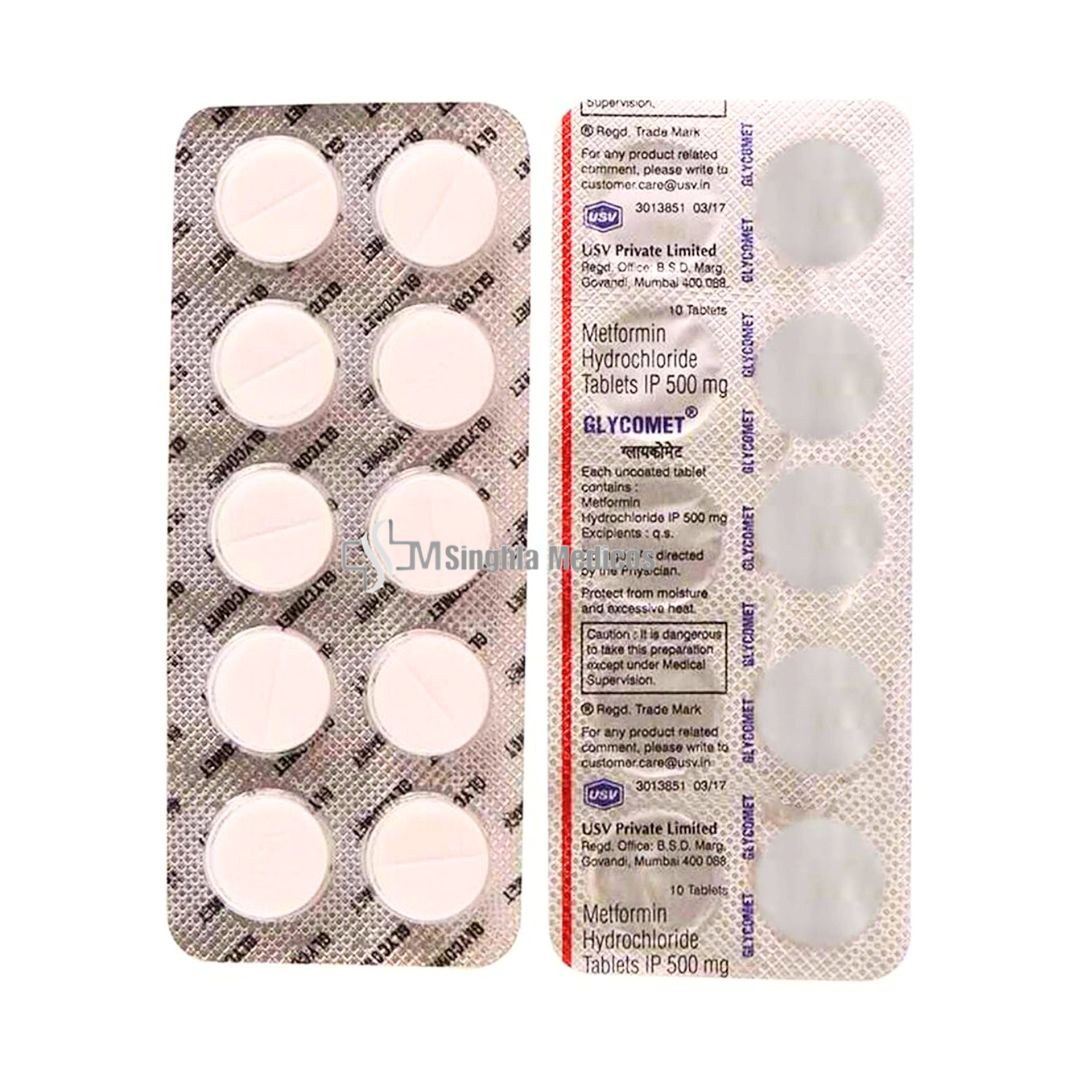

Glycomet Tablet
₹20.94 Original price was: ₹20.94.₹18.85Current price is: ₹18.85.
![]() Prescription Required
Prescription Required
Salt : Metformin (500mg) + Voglibose (0.2mg)
Manufacturer : USV Ltd
Packing : 10 tablets in 1 strip
Product Introduction
Glycomet Tablet is a commonly prescribed medication used primarily for the management of type 2 diabetes mellitus. Its active ingredient is metformin hydrochloride, which belongs to the biguanide class of oral hypoglycemic agents. Metformin works by improving insulin sensitivity, reducing glucose production in the liver, and enhancing glucose uptake in muscle cells. Glycomet is available in various strengths, including 500 mg, 850 mg, and 1000 mg tablets, making it versatile for different patient needs. It is manufactured by various pharmaceutical companies and is typically used as part of a comprehensive diabetes management plan that includes diet and exercise.
Uses of Glycomet Tablet
Glycomet Tablet is mainly used to manage blood glucose levels in individuals with type 2 diabetes mellitus. Its key uses include:
- Blood Sugar Control: Glycomet helps to lower and maintain blood sugar levels within a normal range, reducing the risk of diabetes-related complications.
- Complementary Therapy: It is often prescribed alongside other diabetes medications or insulin to achieve optimal blood glucose control.
- Polycystic Ovary Syndrome (PCOS): Metformin is sometimes used off-label to manage insulin resistance and associated symptoms in women with PCOS.
- Pre-diabetes Management: In some cases, Glycomet may be used to delay the progression from pre-diabetes to type 2 diabetes, particularly in individuals at high risk.
Benefits of Glycomet Tablet
Glycomet Tablet offers several benefits for managing type 2 diabetes:
- Effective Glycemic Control: It helps in significantly lowering blood glucose levels, which can reduce the risk of long-term diabetes complications such as cardiovascular disease, neuropathy, and retinopathy.
- Weight Management: Unlike some other diabetes medications, metformin does not typically cause weight gain and may even aid in weight loss, making it a suitable option for overweight individuals.
- Cardiovascular Benefits: Metformin has been shown to have cardiovascular protective effects, which is beneficial for patients with diabetes who are at increased risk of heart disease.
- Improved Insulin Sensitivity: By enhancing insulin sensitivity, Glycomet helps the body utilize glucose more effectively, which is crucial for managing diabetes.
- No Hypoglycemia Risk: When used alone, Glycomet generally does not cause hypoglycemia (low blood sugar), making it safer compared to some other diabetes medications.
Side Effects of Glycomet Tablet
While Glycomet is generally well-tolerated, some side effects may occur. Common side effects include:
- Gastrointestinal Issues: The most frequent side effects are gastrointestinal disturbances such as nausea, vomiting, diarrhea, and abdominal discomfort. These symptoms often improve with time or dose adjustment.
- Metallic Taste: Some individuals may experience a metallic taste in their mouth while taking Glycomet.
- Lactic Acidosis: Although rare, a serious side effect of metformin is lactic acidosis, a condition characterized by the buildup of lactic acid in the blood. Symptoms include muscle pain, difficulty breathing, abdominal pain, and dizziness. This condition requires immediate medical attention.
- Vitamin B12 Deficiency: Long-term use of metformin can sometimes lead to vitamin B12 deficiency, which may cause symptoms such as fatigue, anemia, and neuropathy.
- Allergic Reactions: Though uncommon, allergic reactions such as rash, itching, or swelling can occur. Severe allergic reactions are rare but require prompt medical intervention.
FAQ
Q1: How should I take Glycomet Tablet?
A1: Glycomet should be taken as prescribed by your healthcare provider. It is usually taken orally with meals to minimize gastrointestinal side effects. Follow the dosage instructions carefully and do not alter the dose without consulting your doctor.
Q2: Can I take Glycomet if I have kidney problems?
A2: Metformin is generally contraindicated in individuals with severe kidney impairment due to the risk of lactic acidosis. If you have kidney problems, discuss with your doctor whether Glycomet is appropriate for you. Your kidney function may need to be monitored regularly.
Q3: Are there any dietary restrictions while taking Glycomet?
A3: There are no specific dietary restrictions when taking Glycomet. However, maintaining a balanced diet and regular exercise is crucial for optimal diabetes management. Consult your healthcare provider or a dietitian for personalized dietary advice.
Q4: Can Glycomet be used during pregnancy?
A4: Glycomet is not typically recommended during pregnancy. If you are pregnant or planning to become pregnant, inform your healthcare provider. They will evaluate the benefits and risks and may suggest alternative treatments.
Q5: What should I do if I miss a dose of Glycomet?
A5: If you miss a dose of Glycomet, take it as soon as you remember unless it is almost time for your next dose. Do not double up on doses to make up for a missed one. Contact your healthcare provider if you have any concerns about missed doses.
References
-
Powers AC, D’Alessio D. Endocrine Pancreas and Pharmacotherapy of Diabetes Mellitus and Hypoglycemia. In: Brunton LL, Chabner BA, Knollmann BC, editors. Goodman & Gilman’s: The Pharmacological Basis of Therapeutics. New York, New York: McGraw-Hill Medical; 2011. pp. 1258-60.
-
Nolte MS. Pancreatic hormones and antidiabetic drugs. In: Katzung BG, Masters SB, Trevor AJ, editors. Basic and Clinical Pharmacology. 11th ed. New Delhi, India: Tata McGraw Hill Education Private Limited; 2009. pp. 741-42.
-
Briggs GG, Freeman RK, editors. A Reference Guide to Fetal and Neonatal Risk: Drugs in Pregnancy and Lactation. 10th ed. Philadelphia, PA: Wolters Kluwer Health; 2015. pp. 873-75.
-
National Health Service. Pregnancy, breastfeeding and fertility while taking metformin. [Last Reviewed: 24
Disclaimer
Singhla Medicos’s primary intention is to ensure that its consumers get information that is reviewed by experts, accurate and trustworthy. The information and contents of this website are for informational purposes only. They are not intended to be a substitute for professional medical advice, diagnosis, or treatment. Please seek the advice of your doctor and discuss all your queries related to any disease or medicine. Do not disregard professional medical advice or delay in seeking it because of something you have read on Singhla Medicos. Our mission is to support, not replace, the doctor-patient relationship.
Shipping Policy
We ship across India. Note – this is subject to change as per Company Wishes. Packages will be shipped in 24 working hours. we are closed on Sundays and will reach you in the next 2-4 days post shipping. We give the estimated time of delivery on the shipping page. However, these are indicative and depend on our shipping partner.
Delivery
The delivery times are subject to location, distance, and our logistics partners. We are not liable for any delays in delivery by the courier company/postal authorities but will help you track down a package through our partner courier services.
Your purchases may reach you from various locations in more than one package. But rest assured, you will be charged one delivery fee for the entire order. As soon as your package ships, we will email you your package tracking information.
We are bound in coverage by their reach even though we use some of India’s largest logistics companies for shipping. In case your address is in a location not served by them we would contact you to find an alternative solution to make your products reach you.












Reviews
There are no reviews yet.